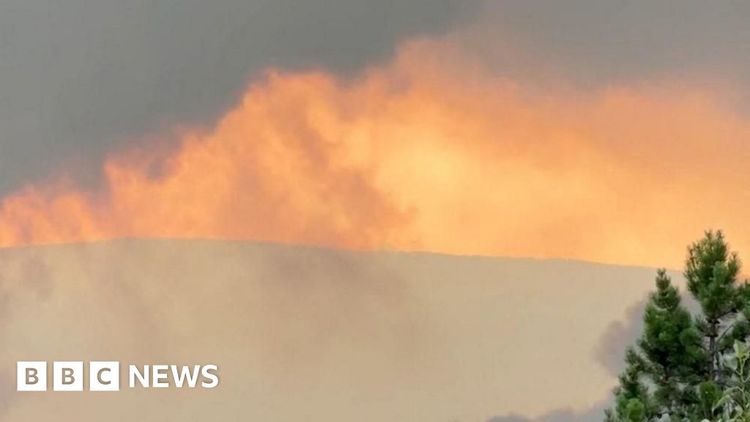Jasper wildfire: Canadian town devastated by fast-moving flames

There have been large, rapidly spreading wildfires that have consumed around half of the old Canadian town of Jasper, according to officials. The fires are still not contained and firefighters are working hard to protect as many buildings as they can.
The fire has destroyed complete streets in the main town of Jasper National Park in western Canada. Videos show wreckage and burnt cars where houses used to be.
Although there have been no fatalities, approximately 20,000 tourists and 5,000 residents have evacuated the mountainous region in Alberta province. This area has been a favorite destination for tourists for many years.
In a meeting with the press on Thursday, Alberta Premier Danielle Smith became emotional as she tried to explain the extent of the destruction. She mentioned that "around 30 to 50 percent" of buildings may have been destroyed.
She acknowledged that this situation is a horrible dream for any community, emphasizing that Jasper National Park has been a source of pride for many generations.
Ms Smith got emotional when she talked about how wonderful the park is and how important it is to the community, which depends a lot on tourism. Around 2.5 million people come to visit the park and Banff National Park nearby every year.
Karyn Decore, who owns the Maligne Lodge in Jasper, was on vacation when she found out that her hotel had been destroyed by fire. She was sent a picture of the burning building on Wednesday night.
"I felt really shocked and upset when I saw that picture," she explained to the BBC. "I believe it will take a few days for the shock to subside."
"It's difficult for everyone to understand that we lost one of our buildings," she said, explaining that she plans to reconstruct the lodge.
BBC reporter Wendy Hurrell was at Jasper National Park when the fires started on Monday. She hastily left town with her husband and daughter, driving throughout the night.
"She said the storm was really strong, the sky turned red and there were strong winds, heavy rain, and lightning," she recounted.
We are among the few remaining visitors who have witnessed Jasper's natural splendor before it suffered substantial damage. It will take a significant amount of time for Jasper to heal and return to its former state. The situation has deeply saddened us all, and my heart feels heavy with sorrow.
Many firefighters from different countries are now working together to assist in the response efforts. However, authorities caution that they are still figuring out just how extensive the damage is. The main goal on Thursday was to control the huge flames that surrounded the town on two fronts.
Pierre Martel, who leads the national fire management program at Parks Canada, explained that the fire began due to a lightning storm and quickly grew on Wednesday night, fueled by strong winds.
"It was huge at that time," said Mr. Martel. "We don't have any resources to handle it."
The fire grew to 100 meters tall in certain areas, rapidly spreading over a large area, as stated by a government official.
Mike Ellis, who is in charge of public safety in Alberta, explained that the fire began 5 kilometers (approximately three miles) away from Jasper. However, due to strong winds, the fire quickly spread to the town in less than half an hour.
He explained that when faced with a large fire approaching rapidly, firefighters have limited options and little control over the situation.
No one expected the fire to spread so rapidly and grow so large in such a short amount of time.
Justin Trudeau, Canada's leader, expressed gratitude to the first responders for their swift action in addressing the wildfires.
"I want to express my gratitude to the courageous first responders who are currently in Alberta, working tirelessly to protect homes and communities in Jasper during this devastating time," he stated.
Environment Canada mentioned that there could be a break from the scorching and parched conditions that fueled the fire, as rain is forecasted to arrive later on Thursday.
This year once again brings challenging fire conditions for the province. In the previous year, a historic 2.2 million hectares were destroyed by fires in Alberta from March 1st to October 31st.
In addition to the ongoing wildfires in Alberta, there are currently over 45 active fires in British Columbia. Fires are also raging in states like California, Oregon, Washington, Montana, and Utah in the United States.
The total amount of fires has gone down globally in the past twenty years.
However, scientists are warning that as the Earth's climate changes, there is a possibility of an uptick in lightning strikes in the forests of northern regions. This could lead to a higher chance of wildfires breaking out.
With extra information provided by Eloise Alanna and Ottilie Mitchell











































